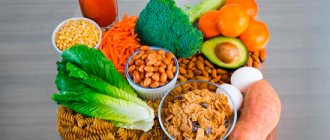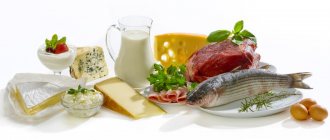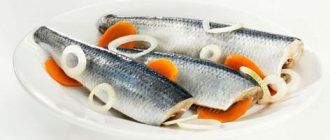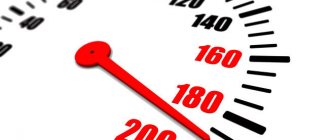Today, carbohydrates are the most controversial organic substance found in foods. For years, nutritionists and doctors have taught us that fat is bad and leads to obesity and high cholesterol. People who wanted to lead a healthy lifestyle deliberately removed animal fats and red meat from their diet, which also led to obesity.
Why do carbohydrates lead to obesity? Nowadays, nutritionists say that it is carbohydrates that are to blame for health problems and recommend avoiding them. In turn, WHO guidelines and other health organizations have consistently taken the position that carbohydrates should form the basis of our diet. So where is the truth?
What are carbohydrates for?
Carbohydrates are organic compounds that are found in the cells of all living things on the planet and act as a source of energy. In the dry mass of plants they are about 80%, in the body of animals and humans - 2–3%.
In the human body, carbohydrates are transformed into glycogen. It acts as a source of energy when blood sugar levels drop. If the energy supply of glycogen is not completely used up, the body converts it into fat. Adipose tissue is deposited in men in the abdomen, in women in the hips, buttocks, chest and arms.
Lack of carbohydrates
It threatens us with serious metabolic disorders in the body. The energy deficit is replaced by the use of fats and proteins. There is an increased load on the activity of the kidneys, and salt metabolism is disrupted. If this continues long enough, the body “oxidizes” and brain processes are disrupted. The level of glycogen decreases, fat settles in the liver cells. Its functions are disrupted, and fatty degeneration begins. Such a terrible picture convinces us of the need for carbohydrates.
But the carbohydrates we get from food are different. What is their difference?
Types and characteristics of carbohydrates
Carbohydrates are divided into two types:
• Simple – they are also called “fast”. • Complex – another term for “slow.”
Simple carbohydrates are sucrose, glucose, fructose and lactose. The body breaks them down easily, and blood sugar levels rise quickly. Hence the name “fast”. The body neutralizes excess sugar with insulin. If you consume simple carbohydrates often and in large quantities, you will become dependent on them, become overweight, and your metabolism will be disrupted. This is dangerous for diabetics and people prone to this disease.
Complex carbohydrates are starch, cellulose, glycogen and pectin. The body absorbs them gradually and blood sugar rises smoothly, without sudden jumps. The energy from these foods is released slowly. Fiber and pectin, rich in carbohydrates, help digestion: normalize microflora and reduce blood sugar.
The type of carbohydrates is determined by the rate of breakdown of products relative to the rate of breakdown of glucose - it is equal to 100 units. This indicator is called the glycemic index: from 0 to 55 - complex slow carbohydrates, above these numbers - simple.
Do carbohydrates cause obesity?
Before answering this question, let's look at what carbohydrates humans have had access to over the centuries. Early humans only had access to fruits in season, and the sugar content of these fruits was much lower than today's varieties. Today in the store you can buy sweets with such a concentrated composition that the human body is not adapted to.
Regular sugars for sweetening or honey were a delicacy, today we replace healthy foods with them every day, increasing our glucose levels to incredible levels. Same with other foods, a hamburger is a pure carbohydrate that will not make you feel full due to the lack of fiber.
Carbohydrates and obesity, where is the connection? The reason for obesity is simple - today a person has unlimited access to food with such a nutrient content that he is not ready for. The main culprit in obesity is carbohydrates, due to the fact that they are much more enjoyable to consume than fats or proteins. A good example is, for example, eating chips or cookies in front of the TV - the brain does not receive information that it is full.
When and what carbohydrates to eat
To correctly determine which carbohydrates to include in what quantities in your diet, you need to take into account your data and lifestyle:
• Age. • Floor. • Body mass index. • Intensity of mental and physical activity. • Health status.
Fast carbohydrates are necessary for professional athletes, students and intellectual workers. They need a quick energy boost, but consumption of foods with glucose should be moderate.
Fast carbohydrates should make up a fifth of your daily volume. Then they will not harm your figure, will help you study and work fully, and will not harm your body.
Slow carbohydrates are the optimal source of energy for overweight people with a sedentary lifestyle. They are also necessary for those who engage in monotonous physical work. Athletes are not included in this category.
Which carbohydrates should you choose?
For a person’s daily diet, a balanced amount of carbohydrates should be chosen, in particular, quickly digestible carbohydrates
allow you to get the necessary amount of energy in a matter of time to perform a certain job: preparing for exams, a speech, an important report. It is enough to eat chocolate, honey and the energy balance will be restored. It's not surprising that athletes use fast carbohydrates to regain strength after training or matches.
If the work requires a long period, then it is better to prefer slow carbohydrates
. It will take more time for the body to break them down, and the resulting energy will be transformed throughout the entire period of work. If you choose fast carbohydrates at the moment, the energy will be released quickly, but it will also run out quickly, not allowing you to complete the intended work to the end, which can cause a person’s nervous state.
What does a lack of carbohydrates lead to?
- depletion of glycogen levels;
- liver dysfunction;
- metabolic disease;
- acidification of the body.
If there is a lack of carbohydrates in the body, both proteins and fats are used for energy production, during the breakdown of which disturbances in metabolic processes and their deposition in the body can occur. Excessive production of ketones combined with fat oxidation can lead to increased oxidation of the body and poisoning of brain tissue, which in turn can cause loss of consciousness.
Main signs of carbohydrate deficiency
- depressive states;
- prostration;
- apathy;
- toxic damage to brain tissue.
If you do not normalize your diet and do not add the required amount of carbohydrates to your diet, your health may worsen.
Excess carbohydrates in the body
High carbohydrate content can lead to:
- increased glucose
- increasing insulin levels;
- formation of fats;
- reducing the calorie content of food.
An excess of simple carbohydrates in the diet can lead to weight gain and fat formation. If a person is unable to maintain a meal schedule and only eats breakfast and dinner, then at the end of the day it can be very difficult for the body to cope with the intake of a huge amount of carbohydrates, which leads to an increase in blood glucose. For glucose to enter cells, it requires insulin, an increase in which can lead to the synthesis of fats.
However, the mechanism of transformation of carbohydrates into fat can only occur with an excessive intake of quickly digestible carbohydrates into the body; for this you will need to eat a small loaf of jam and wash it down with sweet tea. But such a diet can lead to stomach problems and fat accumulation.
Fast carbohydrates in food can lead to an increase in insulin in the blood and cause the development of type 2 diabetes, as well as cardiovascular pathologies.
It should be borne in mind that an indicator of carbohydrate metabolism is the hormones of the adrenal cortex, which lead to increased synthesis of glucose in the liver.
Signs of excess carbohydrates in the body
- excess body weight;
- absentmindedness;
- disorders of the nervous system;
- hyperactivity;
- trembling in the body.
Another organ that suffers from excess carbohydrates is the pancreas. It is located in the left hypochondrium and is presented in the form of an elongated organ responsible for the production of pancreatic juice, required for normal digestion and carbohydrate metabolism. The process occurs due to the presence of islets of Lagenharts framing the surface of the gland; they produce insulin. The pancreatic hormone is responsible for the process of carbohydrate metabolism.
What foods contain complex carbohydrates?
The list of foods rich in complex carbohydrates includes:
• All vegetables, except pumpkin, potatoes, corn. • Berries. • Citrus fruits. • Apricots. • Apples and pears. • Legumes. • Millet, buckwheat, oatmeal, pearl barley.
As for drinks, we include unsweetened tea, coffee, freshly squeezed vegetable, fruit and berry juices, and water.
A small amount of carbohydrates is found in meat, fish, cottage cheese, eggs and kefir. These foods are rich in protein, which is necessary for building muscle, and fat.
The role of carbohydrates in the body
The main role of carbohydrates is to provide the body with energy for the normal functioning of all life processes. Among the secondary, but no less important, functions are:
- protective - the formation of certain types of immune cells, as well as mucopolysaccharides that protect the mucous membranes of the respiratory tract from the penetration of bacteria, is impossible without a sufficient supply of complex carbohydrates;
- plastic - carbohydrates are part of cell membranes, a number of enzymes, and participate in the construction of nucleotides and nucleic acids necessary for the release of energy in cells and the construction of cartilage tissue;
- prebiotic - some types of complex carbohydrates (for example, fiber) are not broken down, but play a significant role in regulating the work of the small and large intestines, the formation of chyme and are a breeding ground for beneficial bacteria in the intestines;
- osmotic - carbohydrates participate in the regulation of osmotic pressure, which ensures the normal flow of blood plasma in the vessels;
- strategic - when carbohydrates are supplied, part of the energy is stored in the body in the form of glycogen and fat deposits for later use.
What foods contain simple carbohydrates?
Fast carbohydrates are found in many healthy foods:
• Potato. • Corn. • Pumpkin. • Pineapple, banana. • Melon and watermelon. • Dried fruits. • White rice. • Nuts. • Baked goods made from wholemeal flour.
If you want to lose weight, the amount of these foods in your diet should be reduced to a minimum.
Harmful foods that are generally best avoided include:
• Sweet carbonated drinks. • Baked goods made from wheat flour. • Cakes, cookies and waffles. • Chocolate and candies. • Sweet dairy products - glazed cheese curds, yoghurts. • Alcohol. • Chips, popcorn and similar snacks.
All these products do not contain useful vitamins, microelements and provide nothing to the body except empty calories.
Are carbohydrates necessary for health?
On the other hand, nutritionists sound the alarm that a diet must provide all the ingredients, while biologically a person can do without sugar. When we don't eat carbohydrates, the body enters ketosis, a state in which the brain begins to feed on ketones. Ketosis is also one of the reasons why we lose weight on a low-carb diet without feeling hungry. In this state, blood glucose levels do not fluctuate and we do not feel hungry.
Eliminating carbohydrates completely from your diet won't kill you, but it may have some negative effects.
Foods containing carbohydrates tend to be high in fiber, and a lack of fiber can cause:
- constipation;
- problems associated with intestinal microflora;
- increased risk of cancer (fiber reduces the absorption of chemicals).
- Vegetables and fruits rich in carbohydrates are also a source of vitamins and minerals. They should be divided into good and bad carbohydrates.
Good carbohydrates include all vegetables, most fruits, legumes, nuts, seeds, brown rice and dark, unprocessed flour, potatoes and sweet potatoes.
You will find bad carbohydrates in sugary drinks and fruit juices (even those without sugar), light bread, ice cream, candy, potatoes and chips.
What foods to eat for weight loss
For breakfast you can eat:
• Crumbly porridge on water. • Toast made from whole grain bread. • Wild rice. • Boiled legumes • Pasta made from durum wheat and bran • Fruits.
If you suddenly give up baked goods, chocolate and cream desserts, your body will crave the usual sweet foods. It is better to replace sweets with fruits rich in fiber and vitamins. This will gradually reduce your cravings for sweets.
From lunch, preference should be given to vegetables. Vegetable side dishes are a good complement to protein foods: fish or meat. They can be boiled, steamed or baked.
Complex carbohydrates for weight loss
Fast and effective weight loss is based on the principles of proper nutrition, which consists of a balanced intake of proteins, fats and complex carbohydrates, excluding foods with simple carbohydrates, as well as ensuring a calorie deficit of 10-15% of the daily value.
When creating a diet for weight loss that can be used for a long time, the following rules must be taken into account:
- calculate and strictly adhere to the carbohydrate norm (4 grams per kilogram of desired weight);
- include slow carbohydrates in the form of vegetables and grains in the menu, which will provide the body with fiber and pectic acids;
- eat more fresh vegetables;
- limit the amount of starchy vegetables (potatoes, zucchini) and fruits in the diet;
- eat 4 times a day;
- drink enough water.
There are diets based on the use of one or more complex carbohydrate foods in the absence of other nutrients, for example:
- Buckwheat - a seven-day diet using buckwheat porridge cooked in water without salt. You can include 2-3 sour apples in the menu.
- The “6 cereals” diet is a dietary meal lasting one week. For six days you need to eat one of the types of cereals (wheat, millet, oatmeal, rice, barley, pearl barley), and on the seventh day choose either one of the proposed cereals or a mixture of all varieties (2 tablespoons each). The last meal on the diet should be no later than 18.00.
- Losing weight on barley - the diet is limited to pearl barley boiled in water without salt for 5 or 7 days.
- Potato diet - for 3 days you should eat 1 kilogram of baked potatoes (4-5 meals) with dill or parsley, but without salt and butter. You are allowed to drink black or green tea without sugar.
- Beets and carrots - the basis of the diet on this diet are raw, baked and boiled root vegetables in unlimited quantities. You can cook vegetables by adding a pinch of salt and olive oil. For a greater feeling of fullness after breakfast, you are allowed to eat 3 walnuts.
- Pectin diet - based on the consumption of apples, parsley and green onions with the additional addition of various cereals (rice, buckwheat) and vegetables (cabbage, cucumbers, peppers) for 5 days.
When following any of these carbohydrate diets, caloric intake should be controlled, since with an excess of calories, weight increases due to the conversion of energy into subcutaneous fat.
Product table.
| Simple | Complex |
| Honey | Cereals and pasta |
| Sugar | Peas |
| Jams and preserves | Lentils |
| Jam | Beans |
| Carbonated drinks | Beet |
| confectionery | Potato |
| White bread | Carrot |
| Sweet fruits | Pumpkin |
| Sweet vegetables | Cereals and cereals |
| Various syrups | Whole wheat bread |
You can find out how many carbohydrates, and at the same time fats, proteins, water and calories in the section Table of calorie content of foods.
Summarize.
Simple and complex carbohydrates are very important for the human body, both of them, as they participate in basic life processes. But you must remember that carbohydrates need to be burned, otherwise they will be stored in your body as fat reserves.
Easily digestible foods should be limited, as they slow down the breakdown process and participate in the building process, that is, they lead to weight gain. They can also develop dependence on this product. Find strength in yourself and try to control your intake of simple carbohydrates. Include porridge, berries, and fruits in your menu.
I will be glad if this material helps you. If so, share this with your friends on social networks, click on the buttons below. Express your opinion or questions in the comments or on the forum.
Related materials:
- How to burn calories to lose weight?
- Reviews about your weight loss.
- Secrets that will help strengthen your willpower.
- How to get rid of the feeling of hunger?
We recommend reading
Add a comment
For gaining muscle mass
A balanced muscle-building diet should consist of foods high in protein, healthy fats, and complex carbohydrates to build and maintain muscle mass that:
- provide the body with energy for strength training;
- replenish glycogen reserves after training;
- promote the production of growth hormone after physical activity, which further stimulates muscle growth;
- ensure the preservation of muscles (if there is a sufficient amount of slow carbohydrates in the diet, proteins from muscles are not used as an energy source).
In order for nutrients not to be stored in fat, but to promote muscle growth, it is necessary to consume complex carbohydrates in the amount of 7-9 grams per 1 kilogram of weight per day, distributing the daily intake as follows:
- in the first half of the day in the form of breakfast, due to which glycogen reserves used up by the body overnight are replenished;
- after training to replenish energy.
Example menu with slow carbs
You won’t need to radically change your eating habits if you choose the right menu.
Taking into account your preferences, you can easily replace your favorite but harmful foods with healthy ones. An example menu for one day for weight loss by 1543 kcal:
- Breakfast (383 kcal): oatmeal pancake with salmon (or trout) 170 g, black tea without sugar 200 ml.
- 1st snack (190 kcal): apple 100 g, mixed nuts 30 g.
- Lunch (524 kcal): chicken and broccoli casserole 400 g, fresh tomatoes 100 g, Greek yogurt 100 g.
- 2nd snack (121 kcal): cottage cheese 5% 100 g.
- Dinner (250 kcal): omelet with champignons 210 g, fresh cucumber 150 g.
- A glass of kefir 1% 2 hours before bedtime (75 kcal).
Chicken and broccoli casserole is perfect for a diet menu. You can also order ready-made rations from the following companies:
Level Kitchen
Rating: 8.32
Level Kitchen is a healthy nutrition delivery service founded by famous athlete Denis Gusev. The service focuses on delivering proper, healthy nutrition for…
Order levelkitchen.com
10%
10% discount on your first order! Promo code:
Use
Requires entering a promo code; The promotion applies to all product categories; The promotion is only available to new customers; The promotion is available without restrictions on the order amount.
Operates from 2020-04-15 00:00:00
Grow Food
Rating: 8.64
Grow Food is a service that promotes healthy eating and is ready to deliver fresh and, most importantly, delicious meals to you every day, depending on your chosen diet. It all works...
Order growfood.pro
MF Kitchen
Rating: 8.5
MF Kitchen is a service of ready-made meals with home delivery. Balanced nutrition, variety of tastes and programs for different purposes. With MF Kitchen it’s easy and tasty to both lose weight and...
Order mfkitchen.ru
How to choose the right source of carbohydrates
If a person losing weight hears the word “carbohydrates,” then most likely he imagines something floury (confectionery), remembering the consequences of such food.
However, this concept includes vegetables, cereals, legumes and milk with complete confidence. A wide selection will satisfy any request. Taking into account the end goal and health characteristics, you can easily create a tasty and healthy menu. Hearty, nutritious, high-carbohydrate foods for weight loss are inexpensive and available for purchase. For example, green vegetables: zucchini, Brussels sprouts, spinach, asparagus, broccoli. They have no starch, but are high in fiber, vitamins and antioxidants.
Among cereals, it is better to give preference to buckwheat. It is rich in protein and fiber. The elements in the composition help lower blood pressure, increase hemoglobin levels and reduce cholesterol levels.
Buckwheat porridge is a source of nutrients.
An alternative to buckwheat porridge is oatmeal. It is better to choose bran or rolled oats. Instant cereal lacks maximum benefits due to processing. Oatmeal contains beta-glucan, a substance that normalizes intestinal microflora and reduces cholesterol levels.
Red beets are considered an excellent source of complex carbohydrates. It contains substances such as betaine and pectin. The first protects the liver from the formation of fatty tissue, and the second cleanses the intestines of toxins. Beets without heat treatment (with a glycogen index of 30) are considered the most useful.
Where are complex carbohydrates found?
To lose weight, you need to revise your menu towards increasing dishes that include complex carbohydrates. Fortunately, their list is quite extensive. A large number of polysaccharides are found in:
- Vegetables and herbs are, first of all, tomatoes, onions, zucchini, celery, cabbage, spinach, and lettuce.
- Berries and fruits - kiwi, apples, figs, cherries.
- Cereals - buckwheat, wheat, brown and white rice, oats.
- Legumes and grains - durum pasta, barley flakes, peas, beans, lentils.
Dishes made from these products can be safely included in your diet. This will contribute not only to weight loss, but also to the overall health of the body. For a quick snack, you can drink a glass of tomato juice or a vegetable smoothie, which are rich in complex carbohydrates.
Among vegetables, the record holder for the content of slow carbohydrates is potatoes. A large amount of nutrients is also found, in descending order, in olives, parsley root, beets, sweet peppers, and white cabbage.
Although potatoes contain a large amount of slow carbohydrates, the dish is high in calories, so it cannot be called dietary.
Among fruits, you should give preference to figs. It will be useful to include pomegranate, cherries, apricots, pears, and oranges in the menu. Of the cereals, corn contains the most complex carbohydrates. Then, in descending order - barley, millet, buckwheat.
If you can’t imagine a meal without bread, choose wheat crackers or bran bread. And of the nuts and legumes, beans are the healthiest. In addition, complex carbohydrates are contained in lentils, soybeans, and pine nuts.











